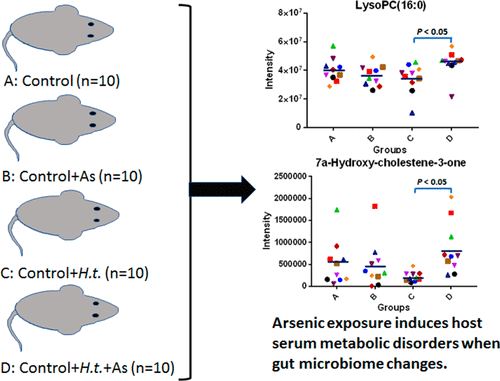当前位置:
X-MOL 学术
›
J. Proteome Res.
›
论文详情
Our official English website, www.x-mol.net, welcomes your
feedback! (Note: you will need to create a separate account there.)
Serum Metabolomics Reveals That Gut Microbiome Perturbation Mediates Metabolic Disruption Induced by Arsenic Exposure in Mice.
Journal of Proteome Research ( IF 3.8 ) Pub Date : 2019-01-25 , DOI: 10.1021/acs.jproteome.8b00697 Jingchuan Xue 1 , Yunjia Lai 1 , Liang Chi 1 , Pengcheng Tu 1 , Jiapeng Leng 1 , Chih-Wei Liu 1 , Hongyu Ru 2 , Kun Lu 1
Journal of Proteome Research ( IF 3.8 ) Pub Date : 2019-01-25 , DOI: 10.1021/acs.jproteome.8b00697 Jingchuan Xue 1 , Yunjia Lai 1 , Liang Chi 1 , Pengcheng Tu 1 , Jiapeng Leng 1 , Chih-Wei Liu 1 , Hongyu Ru 2 , Kun Lu 1
Affiliation

|
Arsenic contamination in drinking water has been a worldwide health concern for decades. In addition to being a well-recognized carcinogen, arsenic exposure has also been linked to diabetes, neurological effects, and cardiovascular diseases. Recently, increasing evidence has indicated that gut microbiome is an important risk factor in modulating the development of diseases. We aim to investigate the role of gut microbiome perturbation in arsenic-induced diseases by coupling a mass-spectrometry-based metabolomics approach and an animal model with altered gut microbiome induced by bacterial infection. Serum metabolic profiling has revealed that gut microbiome perturbation and arsenic exposure induced the dramatic changes of numerous metabolite pathways, including fatty acid metabolism, phospholipids, sphingolipids, cholesterols, and tryptophan metabolism, which were not or were less disrupted when the gut microbiome stayed normal. In summary, this study suggests that gut microbiome perturbation can exacerbate or cause metabolic disorders induced by arsenic exposure.
中文翻译:

血清代谢组学揭示肠道微生物组扰动介导小鼠砷暴露引起的代谢紊乱。
几十年来,饮用水中的砷污染一直是世界范围内的健康问题。砷除了是一种公认的致癌物质外,还与糖尿病、神经系统影响和心血管疾病有关。最近,越来越多的证据表明肠道微生物组是调节疾病发展的重要危险因素。我们的目的是通过将基于质谱的代谢组学方法与细菌感染引起的肠道微生物组改变的动物模型相结合,研究肠道微生物组扰动在砷引起的疾病中的作用。血清代谢分析显示,肠道微生物组扰动和砷暴露引起了许多代谢途径的巨大变化,包括脂肪酸代谢、磷脂、鞘脂、胆固醇和色氨酸代谢,当肠道微生物组保持正常时,这些代谢途径不会受到或较少受到干扰。总之,这项研究表明肠道微生物组扰动可能会加剧或导致砷暴露引起的代谢紊乱。
更新日期:2019-02-07
中文翻译:

血清代谢组学揭示肠道微生物组扰动介导小鼠砷暴露引起的代谢紊乱。
几十年来,饮用水中的砷污染一直是世界范围内的健康问题。砷除了是一种公认的致癌物质外,还与糖尿病、神经系统影响和心血管疾病有关。最近,越来越多的证据表明肠道微生物组是调节疾病发展的重要危险因素。我们的目的是通过将基于质谱的代谢组学方法与细菌感染引起的肠道微生物组改变的动物模型相结合,研究肠道微生物组扰动在砷引起的疾病中的作用。血清代谢分析显示,肠道微生物组扰动和砷暴露引起了许多代谢途径的巨大变化,包括脂肪酸代谢、磷脂、鞘脂、胆固醇和色氨酸代谢,当肠道微生物组保持正常时,这些代谢途径不会受到或较少受到干扰。总之,这项研究表明肠道微生物组扰动可能会加剧或导致砷暴露引起的代谢紊乱。











































 京公网安备 11010802027423号
京公网安备 11010802027423号